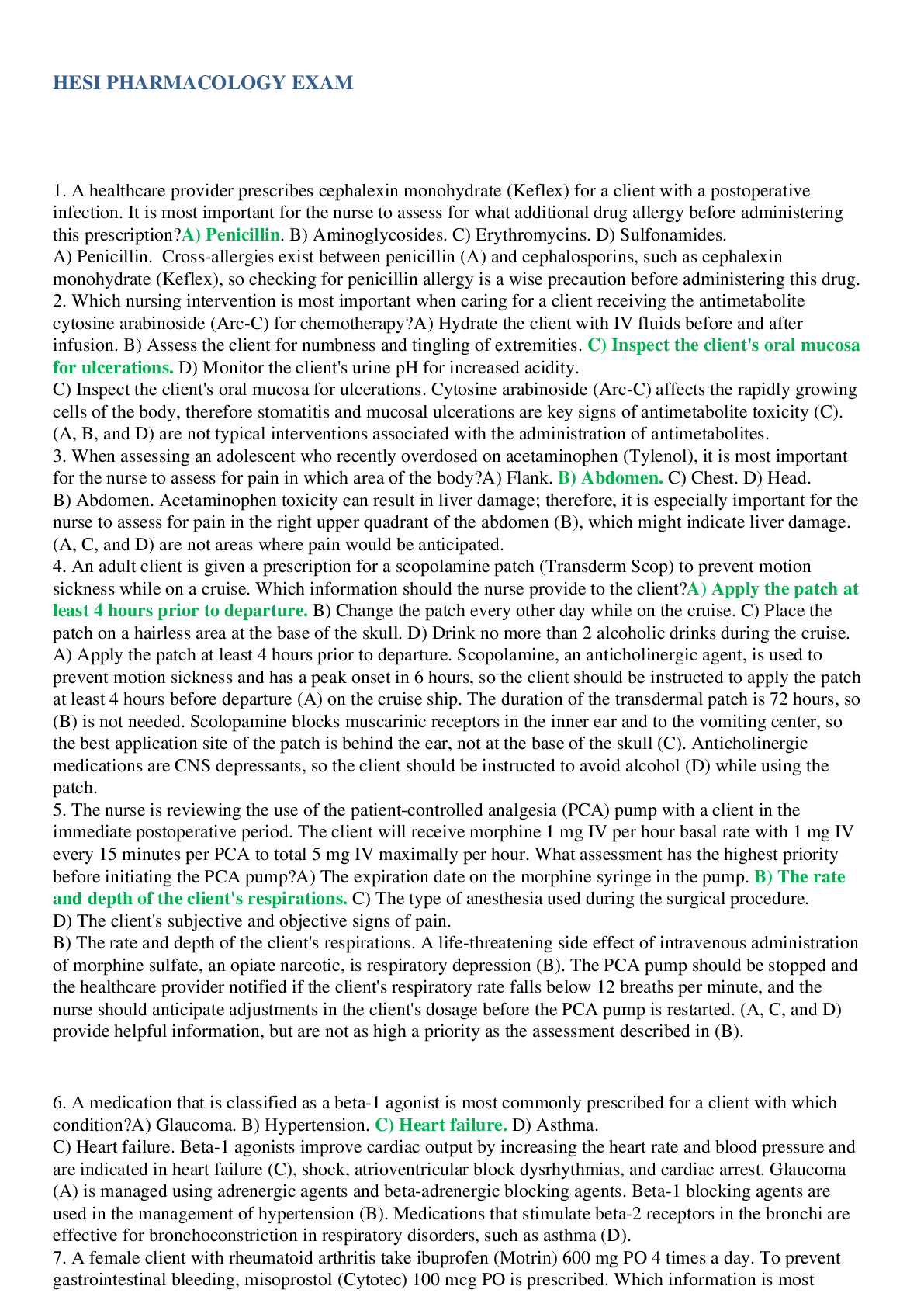Fundamentals Hesi prep A 1, QUESTIONS AND 100% ACCURATE ANSWERS, GRADED A.
Document Content and Description Below
Fundamentals Hesi prep A 1, QUESTIONS AND 100% ACCURATE ANSWERS, GRADED A. A nurse is helping a client to maintain and regain health, manage his or her disease and symptoms, and attain a maximal l... evel of function and independence through the healing process. What role is the nurse playing? A. Manager B. Advocate C. Caregiver D. Communicator A,B,E - A nursing student is listing risk factors that affect the health and wellness of a client. Which risk factors listed by the nursing student are accurate? Select all that apply A. Lifestyle B. Environment C. Spiritual Factors D. Emotional Factors E. Genetic and physiological factors B,C,D - What services do nurse-managed clinics provide in preventive and primary care services? Select all that apply A. Crisis intervention B. Wellness counseling C. Health risk appraisal D. Employment readiness E. Communicable disease controlB,C,D - What services do community health centers provide in preventive and primary care services? Select all that apply. A. Daycare B. Health screenings C. Physical assessments D. Disease management E. Acute and chronic care management A - A 3-year-old child with eczema of the face and arms has disregarded the nurse's warnings to "stop scratching, or else!" The nurse finds the toddler scratching so intensely that the arms are bleeding. The nurse then ties the toddler's arms to the crib sides, saying, "I'm going to teach you one way or another." How should the nurse's behavior be interpreted? A. These actions can be construed as assault and battery B. The problem was resolved with forethought and accountability C. Skin must be protected, and the actions taken were by a reasonably prudent nurse D. The nurse had tried to reason with the toddler and expected understanding and cooperation B - A primary healthcare provider notes that all conventional treatment procedures have proved to be ineffective in managing a client's disorder. The primary healthcare provider decides to try an experimental treatment. The nurse ensures that the client has understood the implications of the new treatment plan thoroughly and then signs the client's consent form as a witness. Which basic healthcare ethic does the nurse follow in this situation? A. Justice B. Autonomy C. Beneficence D. Normalficence B,C,D - A nurse educates a client about the role played by an individual in taking responsibility for health and wellness and its impact. What instructions should the nurse give? Select all that apply. A. "An individual should use passive strategies for health promotion." B. "An individual should know that lifestyle choices affect his or her quality of life and well-being." C. "An individual should take responsibility of health and wellness by making proper lifestyle choices."D. "An individual should realize that illness prevention has a positive economic impact on his or her life." E. "An individual should understand that it is enough to make positive lifestyle choices in order to prevent illness." C - A registered nurse is teaching a nursing student about the standards of nursing practice. How would the nursing student define assessment? A. Assessment is the process of coordinating care delivery B. Assessment is the process of analyzing assessment data to determine diagnoses or issues C. Assessment is the process of collecting comprehensive data pertinent to the client's health and/or situation D. Assessment is the process where a registered nurse provides consultation to influence an identified plan, enhances the abilities of other caregivers, and effects change C - A client with cancer is undergoing treatment in a hospital. The nurse finds the orders from the primary healthcare provider inappropriate. Clarification from the healthcare provider does not resolve the nurse's doubts. Who should the nurse contact and inform next? A. Risk manager B. Nursing student C. supervising nurse D. nurse administrator D - A nursing student is recalling information about hospice care. What is hospice care? A. Hospice care is a resident's temporary or permanent home, where the surroundings have been made as homelike as possible B. Hospice care offers an attractive long-term care setting with an environment akin to the client's home, which offers the client greater autonomy C. Hospice care is a service that provides short-term relief for people providing home care to an ill, disabled, or frail older adult. D. Hospice care is a system of family-centered care that allows clients to remain at home in comfort while easing the pains of terminal illness A - An octogenarian client asks the nurse about the United States' government-funded national health insurance program. About which healthcare plan should the nurse inform the client?A. Medicare B. Long-term care insurance C. Private insurance D. Preferred provider organization D - What does a nurse understand by the quality improvement competency, according to Quality and Safety Education (QSEN)? A. Using information and technology to communicate, manage knowledge, mitigate errors, and support decision-making B. Integrating best current evidence with clinical expertise along with client and family preferences and values for the delivery of quality healthcare C. Functioning effectively within nursing and interprofessional teams by fostering open communication, mutual respect, and shared decision making to achieve quality client care D. Using data to monitor the outcomes of care processes and use improvement methods to design and test changes to continuously improve the quality and safety of health care systems D - A nurse is caring for a client with renal failure. The client wants to go back home but the family members want the client to undergo a kidney transplant. The nurse gives details about the possible threats and benefits of the surgery to the family and informs them that the client wants to stay home. What role does the nurse play here? A. Educator B. Manager C. Caregiver D. Advocate A - A registered nurse is educating a nursing student about the stages of changes in a client's health behavior. Which statement describes the stage of contemplation? A. The client considers a change within the next 6 months. B. The client does not intend to make changes within the next 6 months C. The client is actively engaged in strategies to change behavior; this lasts up to 6 months. D. The client displays sustained change over time; this begins 6 months after action has started and continues indefinitelyA - A registered nurse is educating a nursing student about the process of resolving an ethical dilemma. What information should the nurse provide regarding negotiation of outcomes? A. "A nurse should provide a personal point of view." B. Negotiations should be held in formal settings only. C. "Negotiation takes place immediately after gathering information. D. The group agrees to a statement of the problem during the negotiation process. C - A nurse is caring for a client with pain after surgery. The nurse takes the blood pressure and pulse rate of the client and asks the client to rate the level of pain on the pain scale. The nurse then notifies the primary healthcare provider. Which standard of practice does the nurse perform? A. Planning B. Diagnosis C. Assessment D. Implementation A - The professional obligation of a nurse to assume responsibility for actions is referred to as what? A. Accountability B. Individuality C. Responsibility D. Bioethics A - While visiting the hospital, the spouse of a client slips and falls on a recently washed floor in the hallway leading to the client's room. To meet the criteria of ethical practice, what action should the nurse who witnessed the occurrence take? A. Initiate an agency incident report. B. Report the fall to the state (provincial) health department C. Write a brief description of the incident to be kept by the nurse manager D. Determine that no documentation is needed because the visitor is not a client in the hospitalB - Which act protects a person who is HIV positive? A. The National Organ Transplant Act B. The Americans with Disabilities Act (ADA C. The Patient Self-Determination Act (PSDA) D. The Health Insurance Portability and Accountability Act of 1996 (HIPAA A - A nursing student is recalling the definitions of acts that are classified as torts in nursing practice. Which tort involves intentional touching without the client's consent? A. Battery B. Invasion of privacy C. False imprisonment D. Defamation of Character B - What is the professional nurse's legal responsibility regarding child abuse? A. Honor the request of the parents not to report the suspected abuse. B. Report any suspected abuse to local law enforcement authorities. C. Return the child to the legal parent even if he or she is suspected of abuse D. Provide the parents with a copy of the child's medical record. B - Which role does a nurse play when helping clients to identify and clarify health problems and to choose appropriate courses of action to solve those problems? A. Educator B. Counselor C. Change agent D. Case manager C - A nursing student lists the preventive and primary care services available in schools, primary healthcare provider's offices, occupational health clinics, community health centers, and nursing centers. Which service provided by these centers is most expensive? A. Running errandsB. Health education C. Disease management D. Routine physical examinations B - What is the role of a nurse administrator in a healthcare setting? A. Providing surgical anesthesia under the guidance and supervision of an anesthesiologist B. Preparing the budget, staffing, strategic planning of programs and services, employee evaluations, and employee development C. Providing comprehensive care by directly managing the medical care of clients who are healthy or who have chronic conditions D. Providing knowledge about current nursing practices, trends, theories, and necessary skills in laboratories and clinical settings B - An unemancipated pediatric client is to undergo a medical procedure. Who is the appropriate authority to provide consent? A. the court B. either of the childs parents C. one of the childs grandparents D. the parent who holds legal custody [Show More]
Last updated: 1 year ago
Preview 1 out of 8 pages
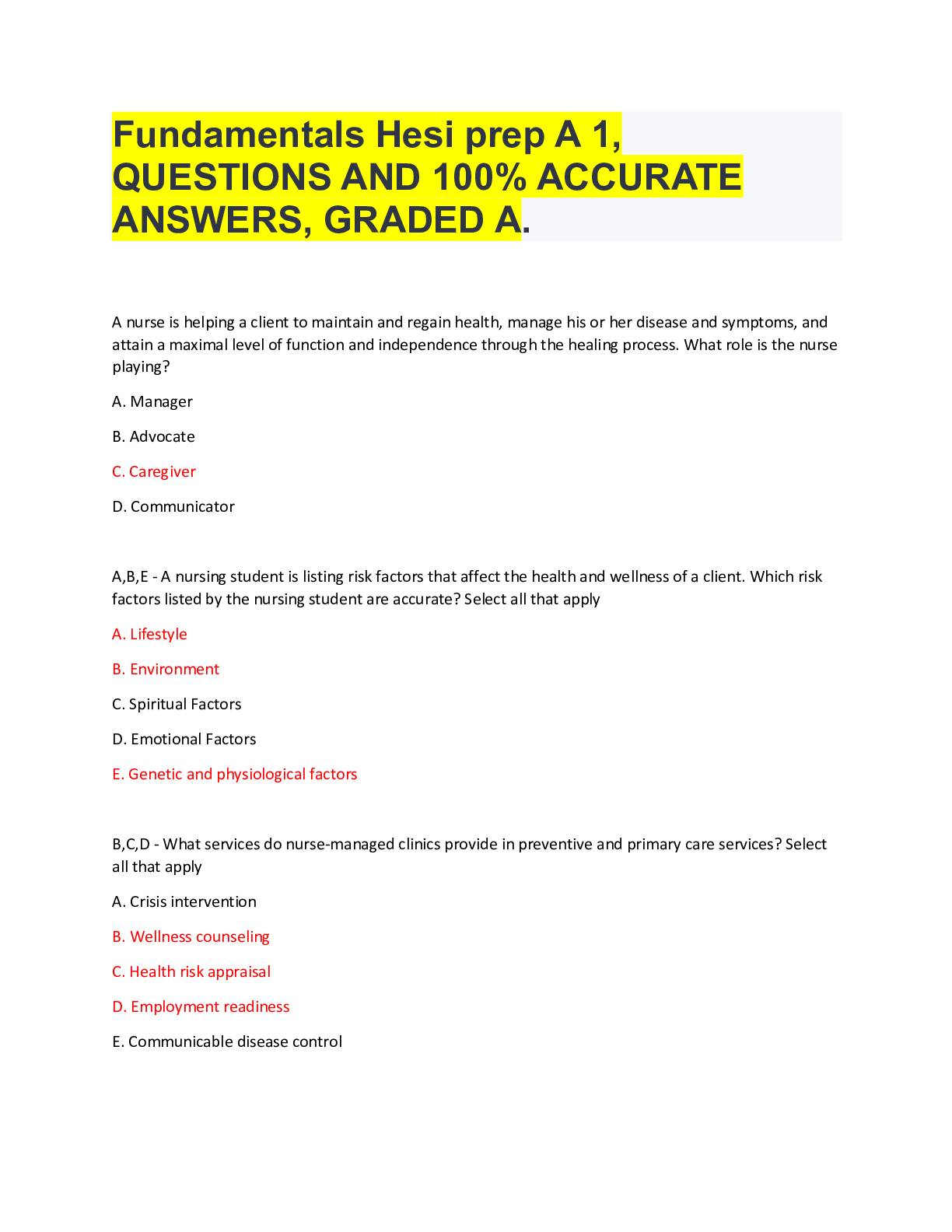
Reviews( 0 )
Document information
Connected school, study & course
About the document
Uploaded On
May 17, 2022
Number of pages
8
Written in
Additional information
This document has been written for:
Uploaded
May 17, 2022
Downloads
0
Views
21

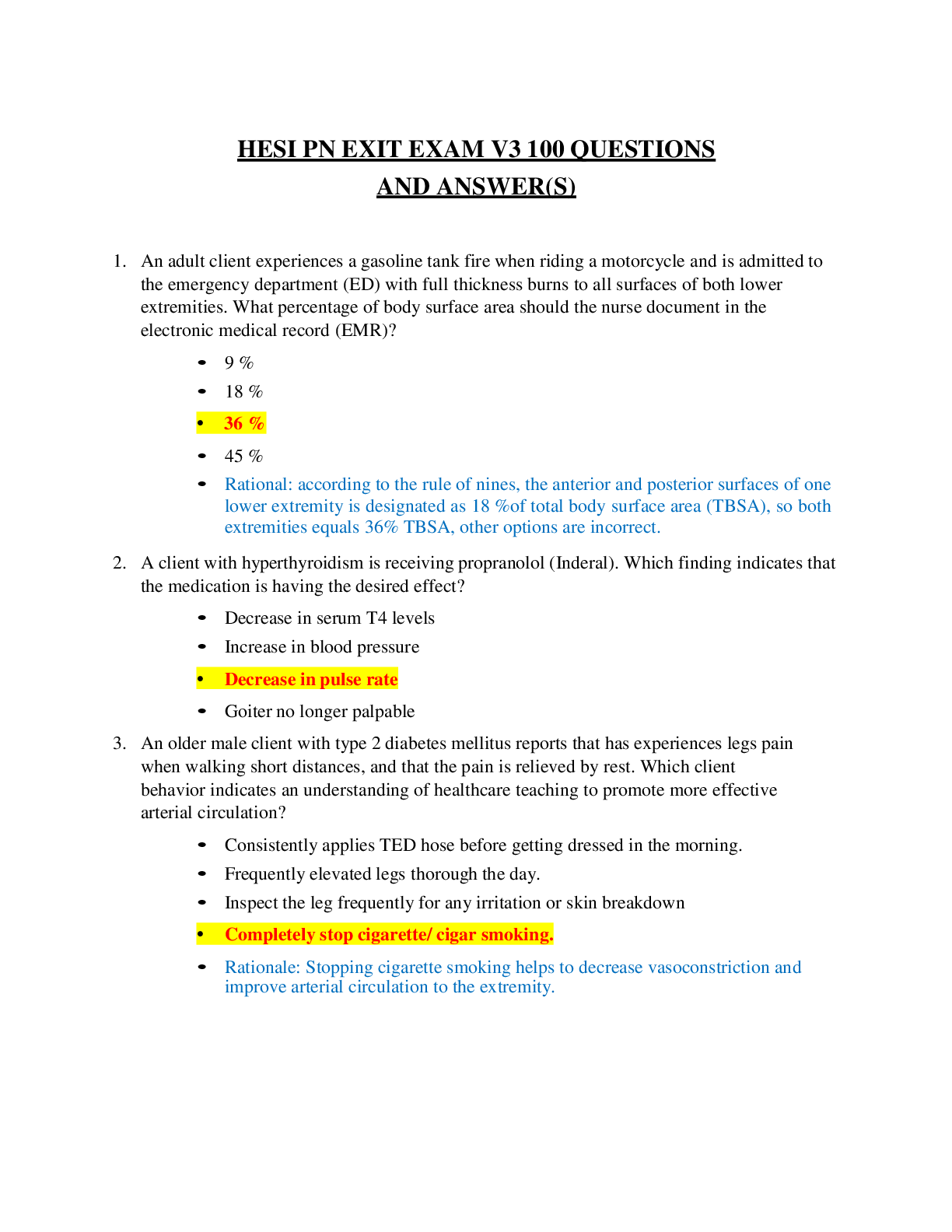
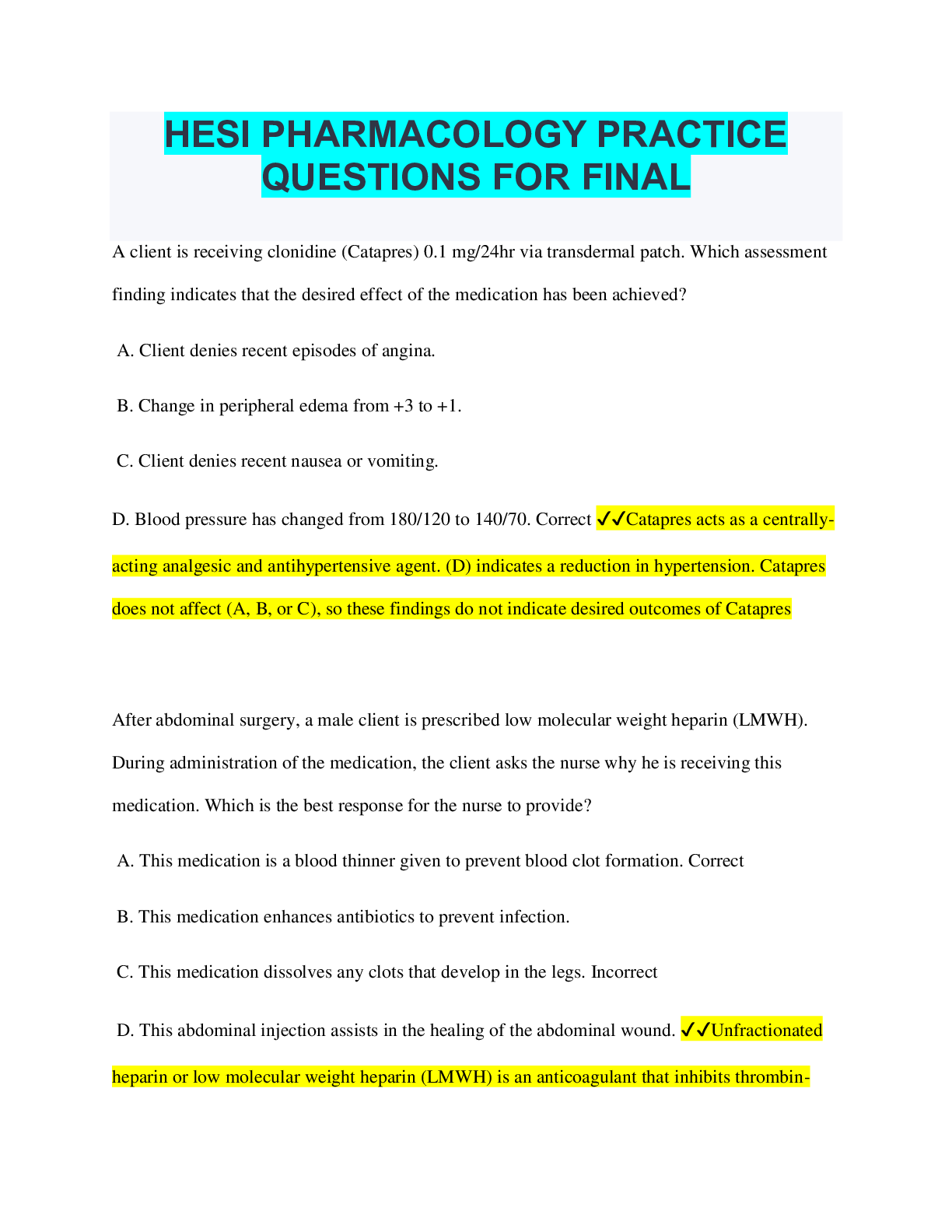
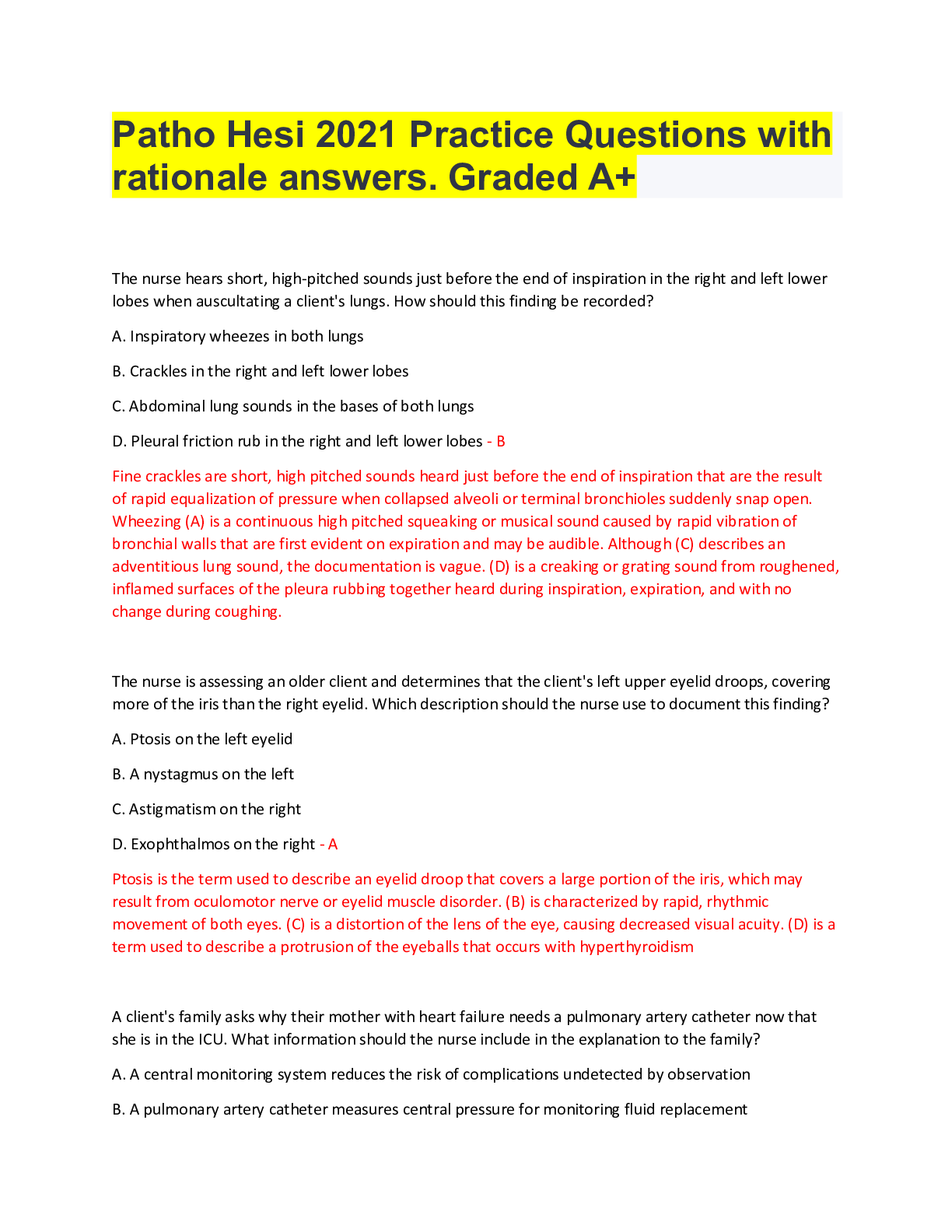
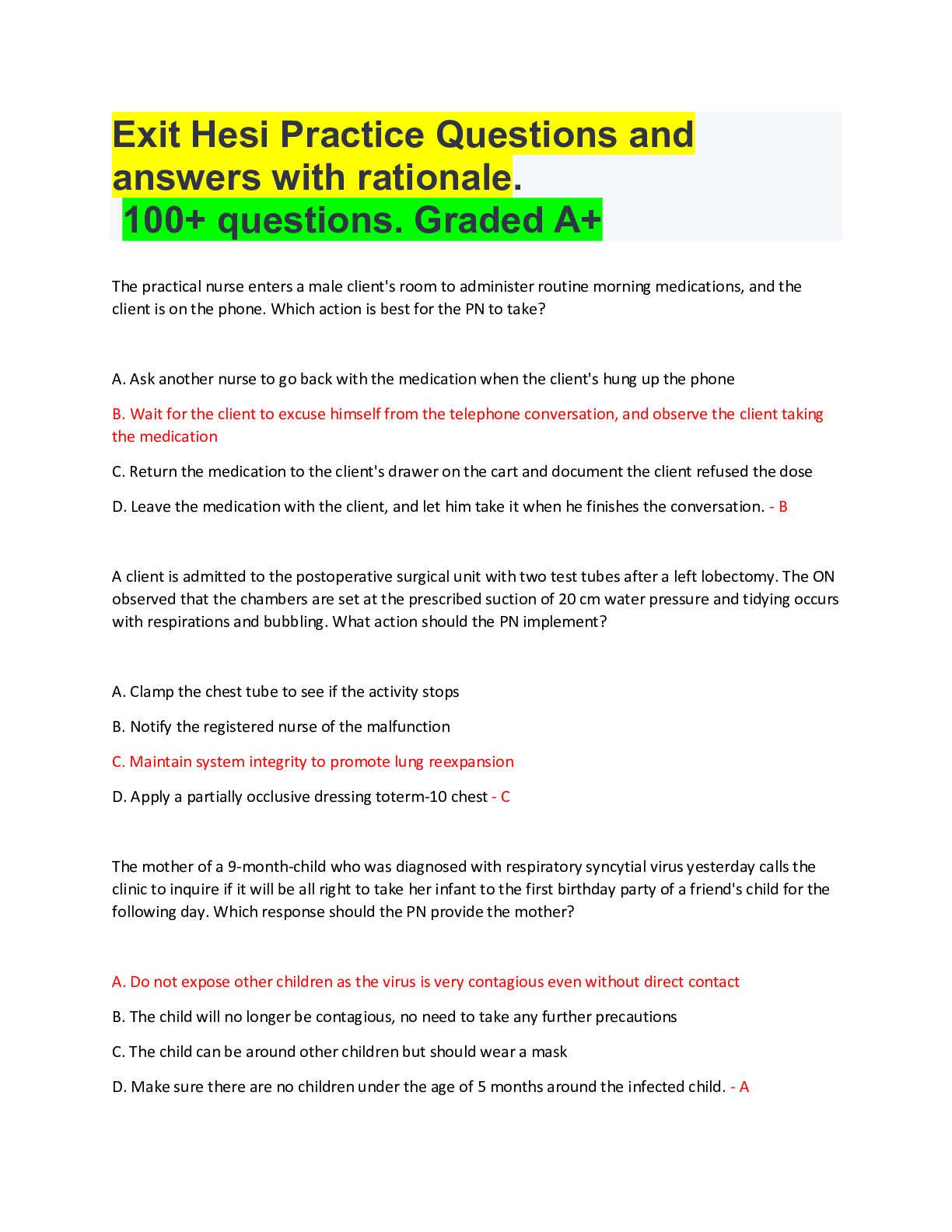
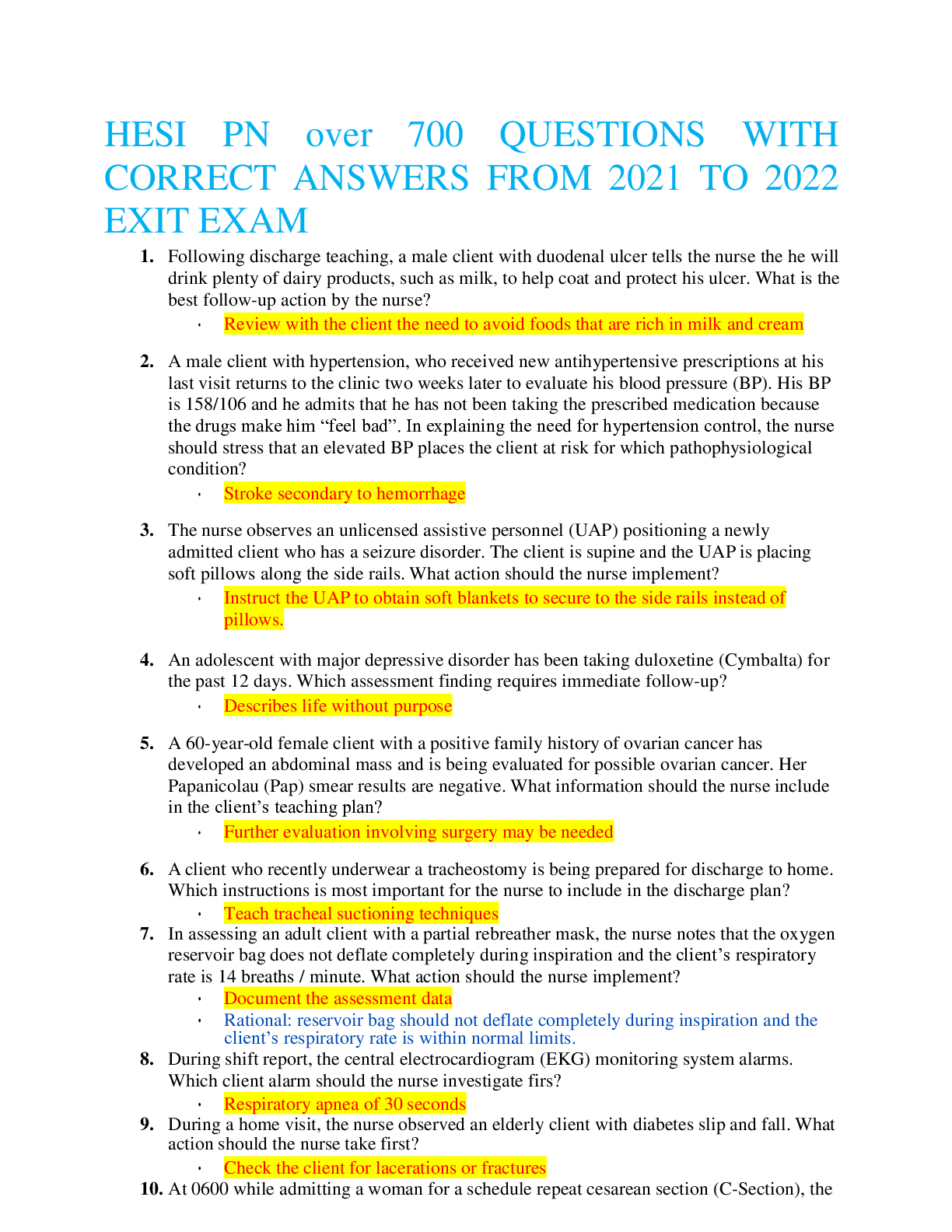
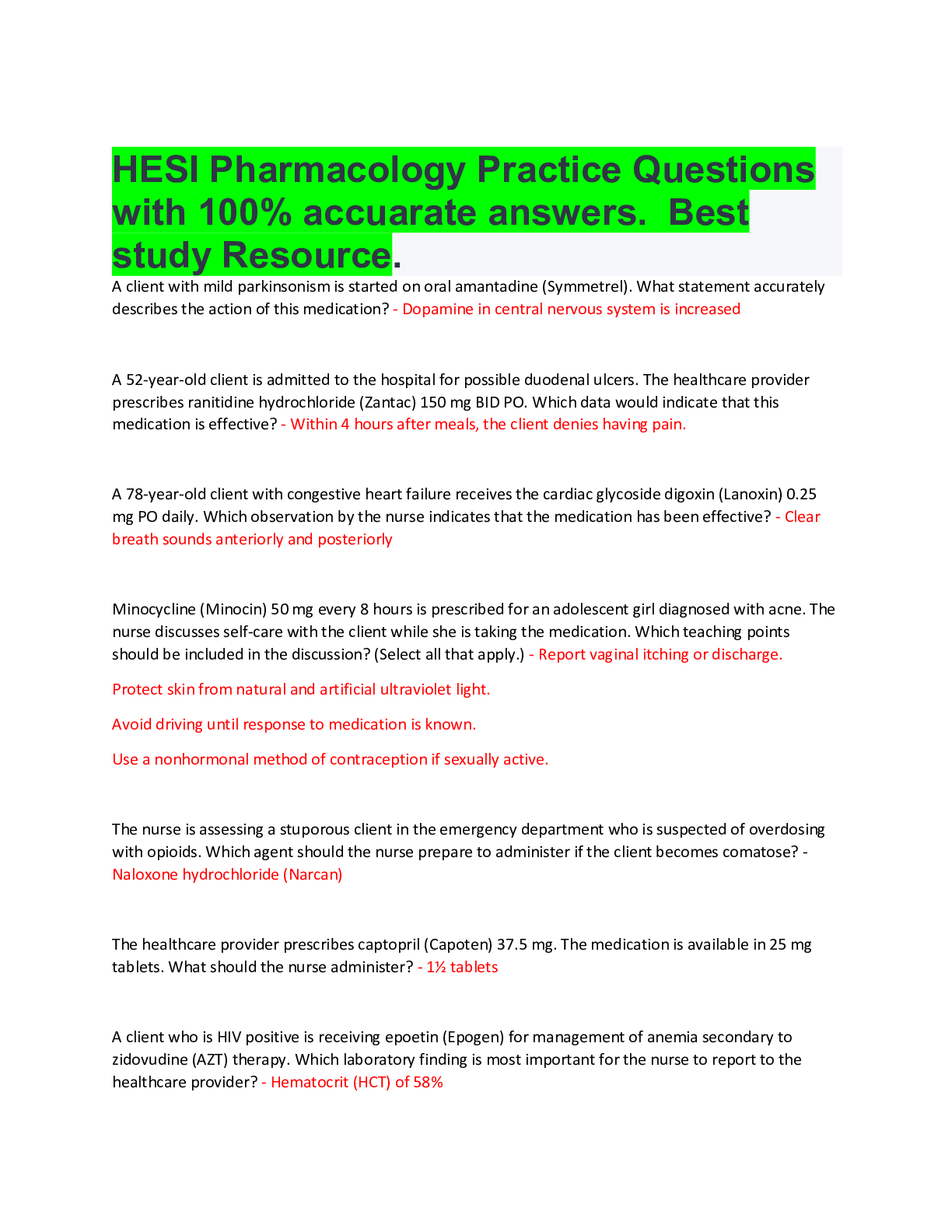
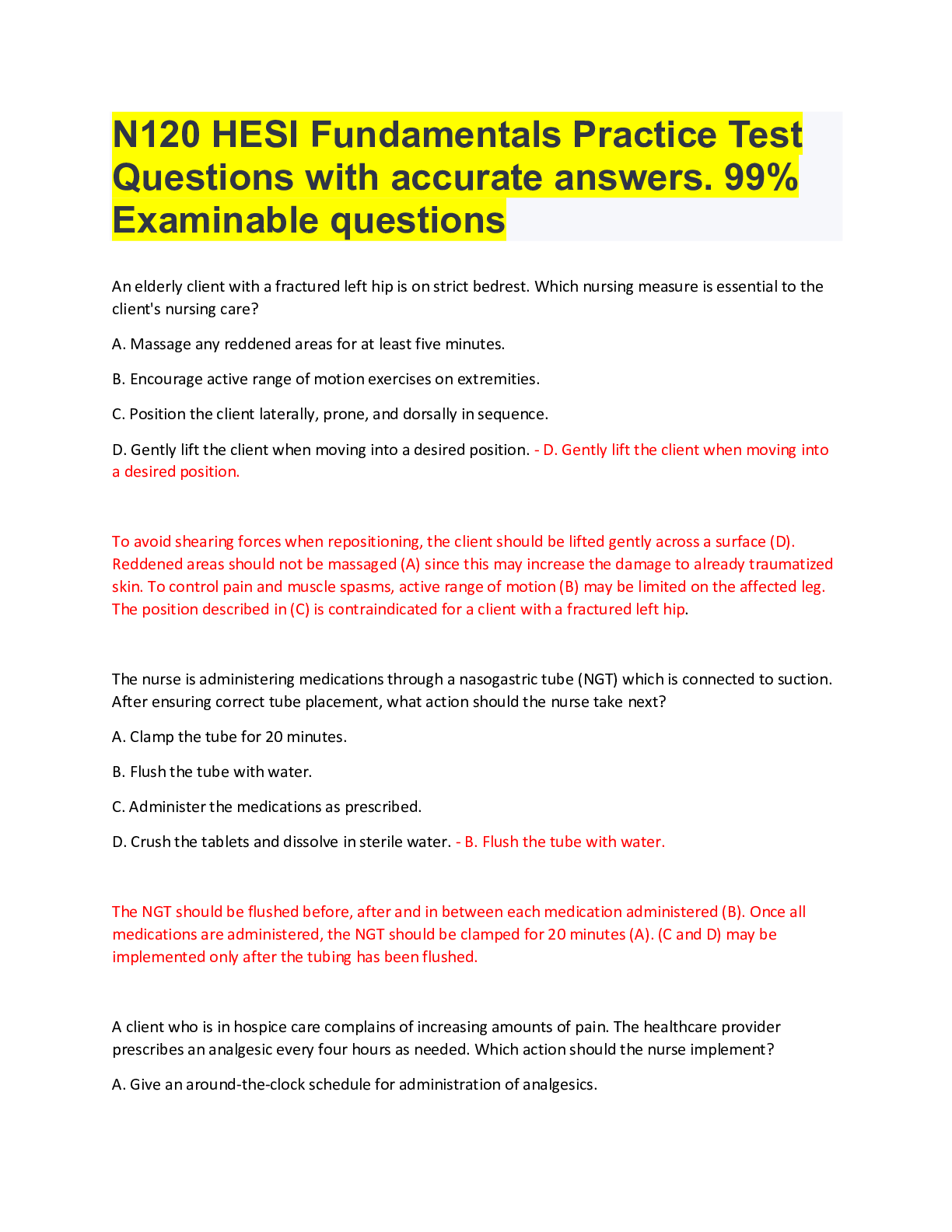
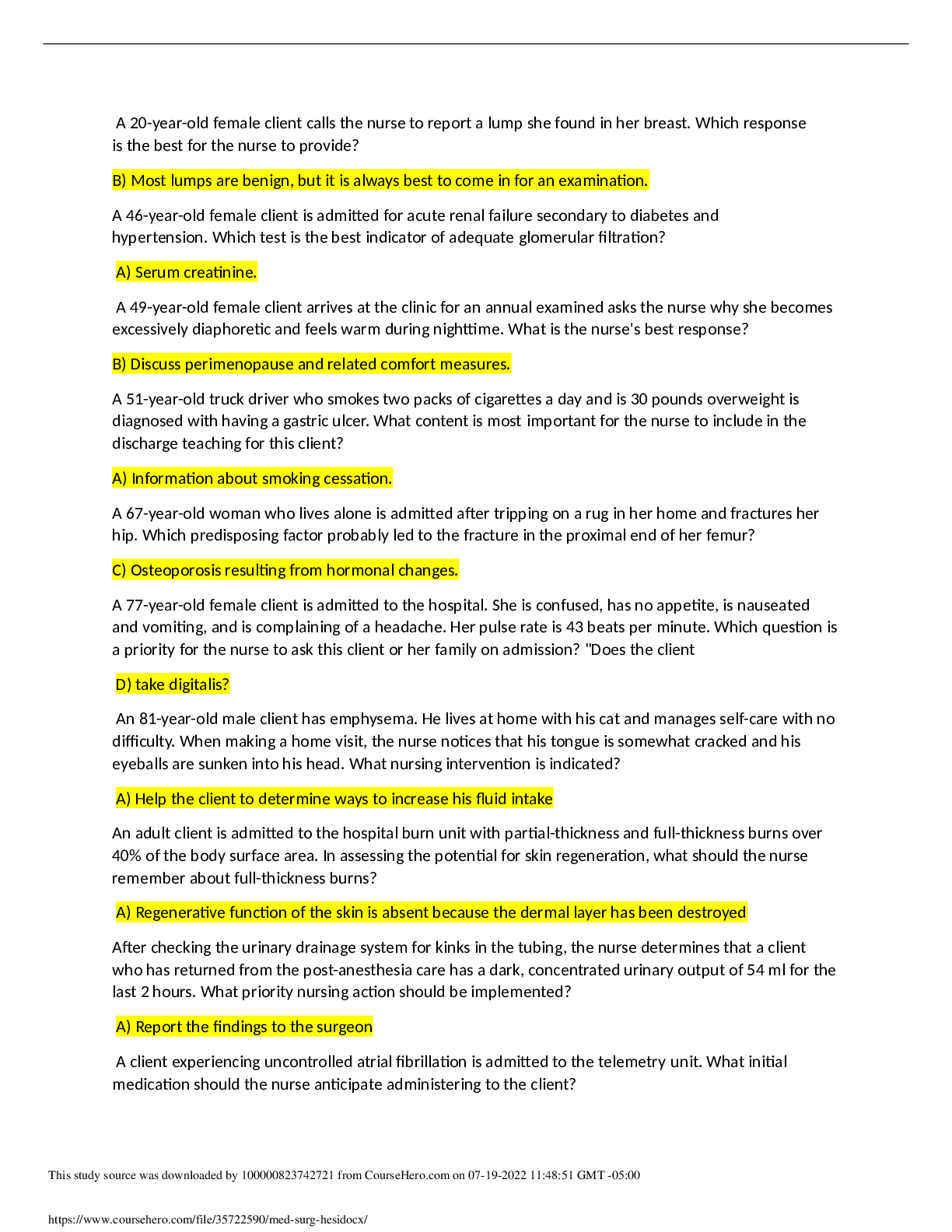
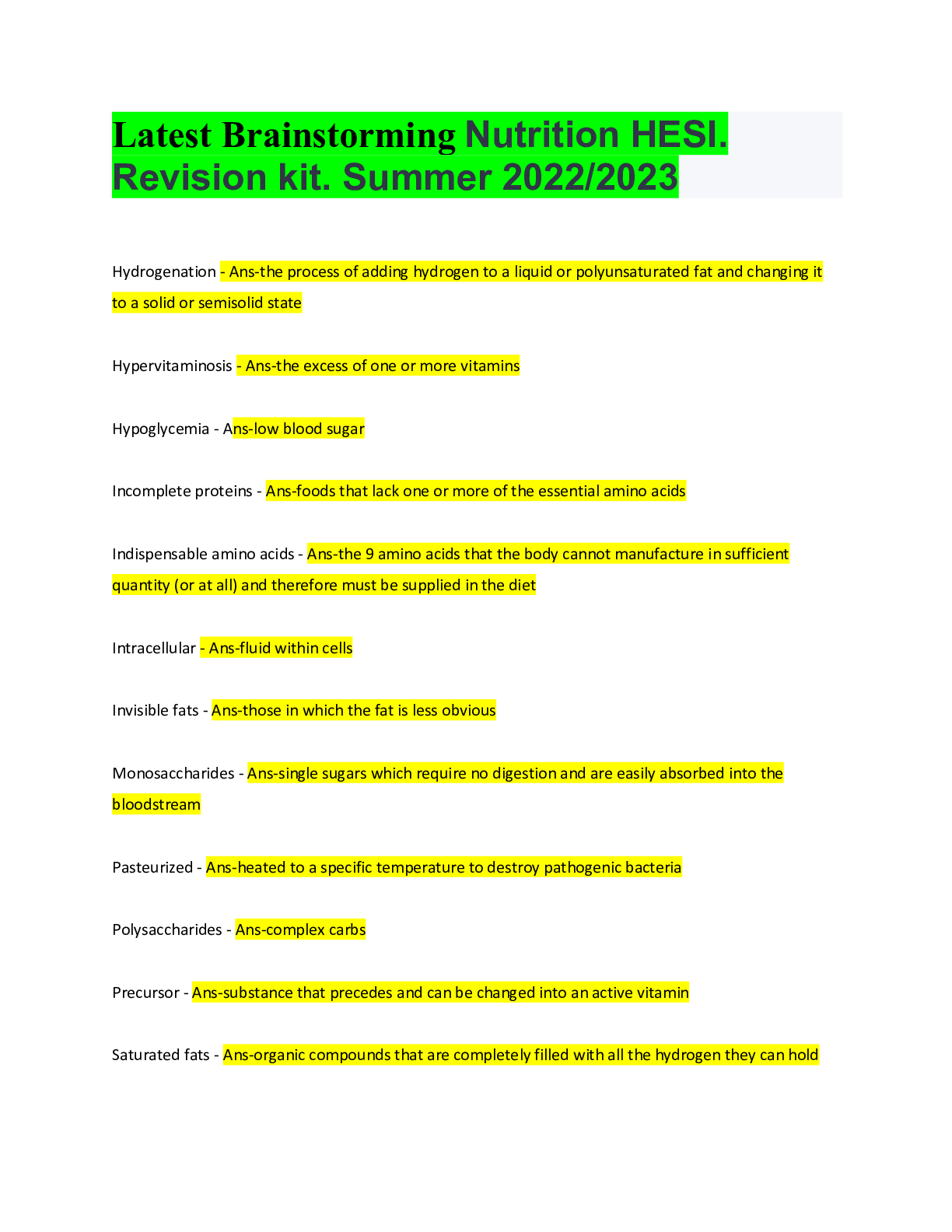
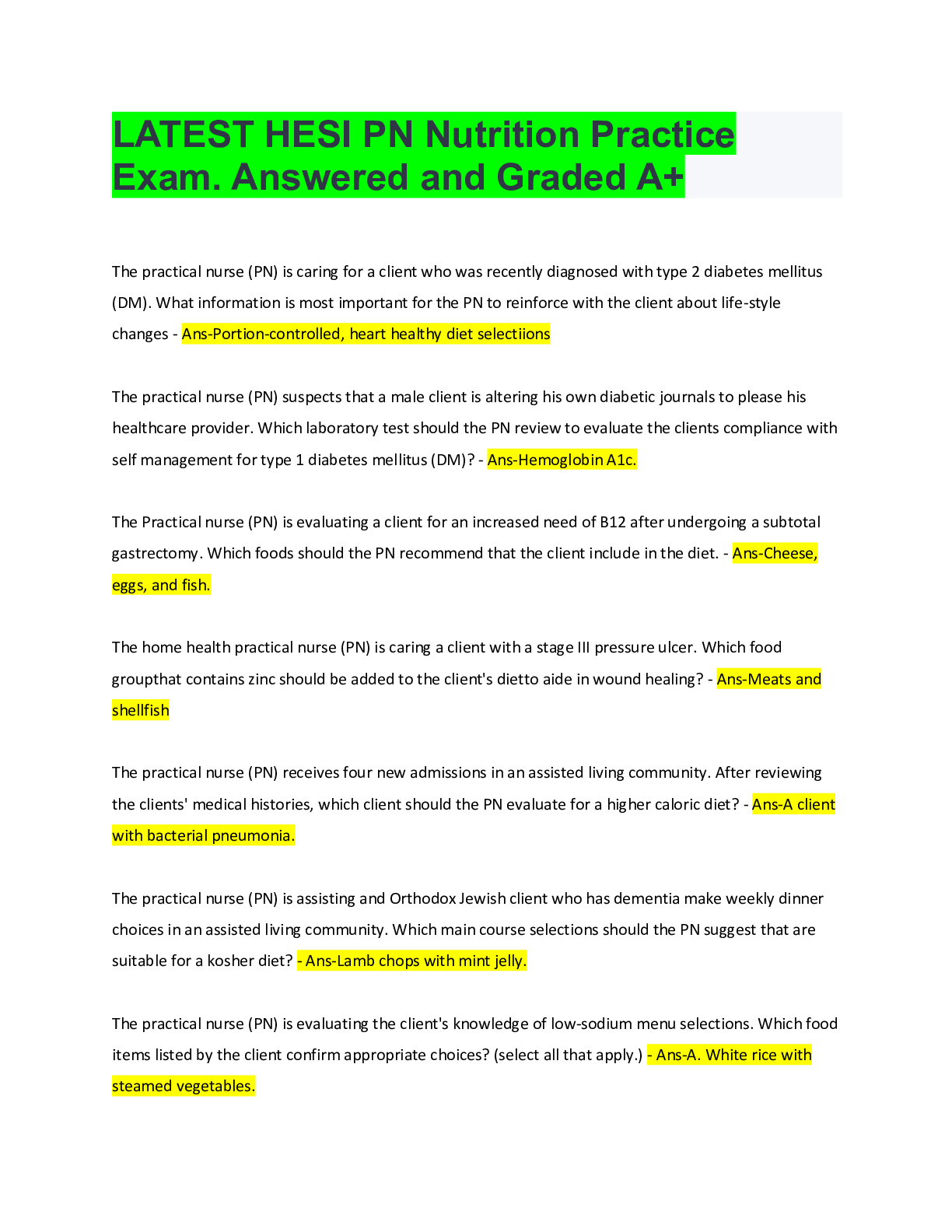
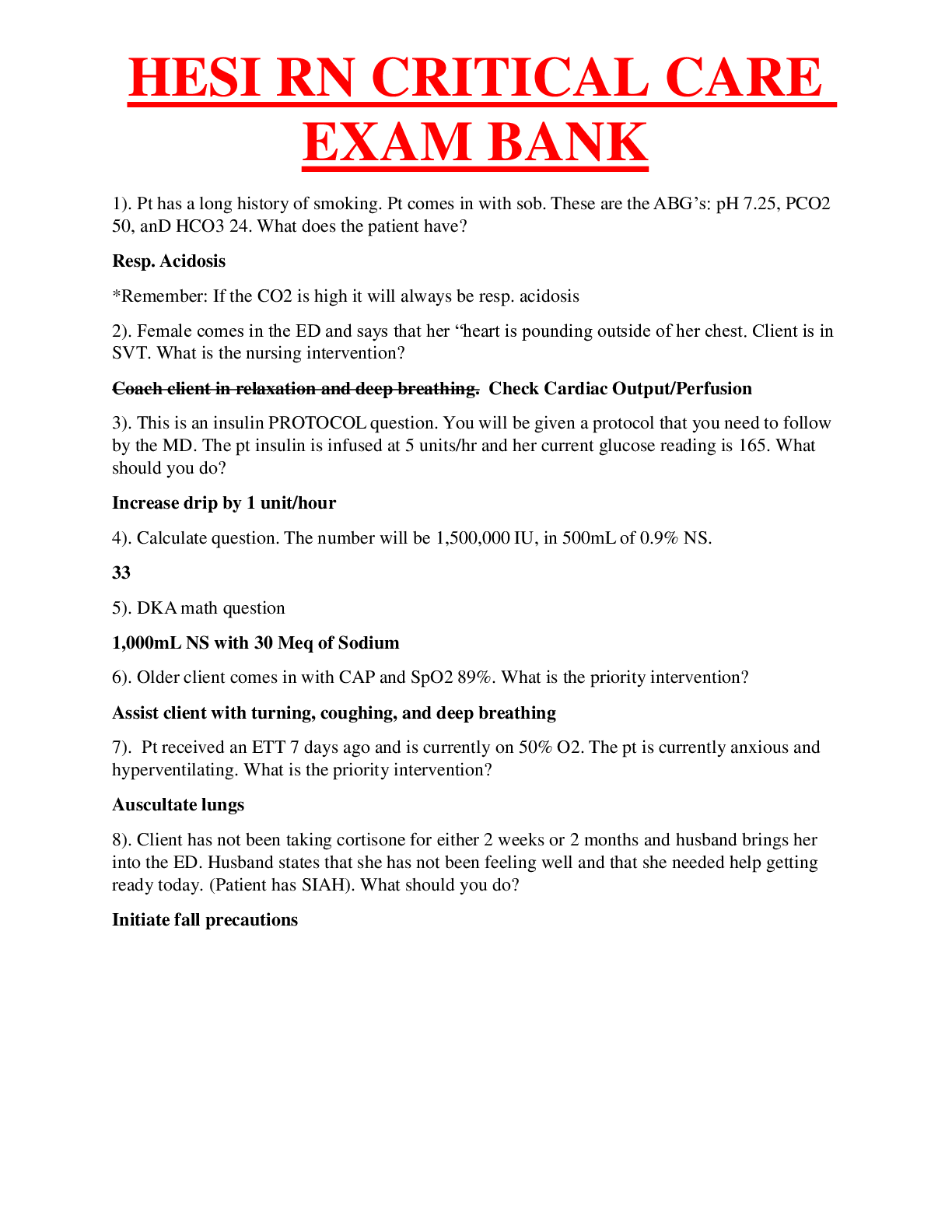
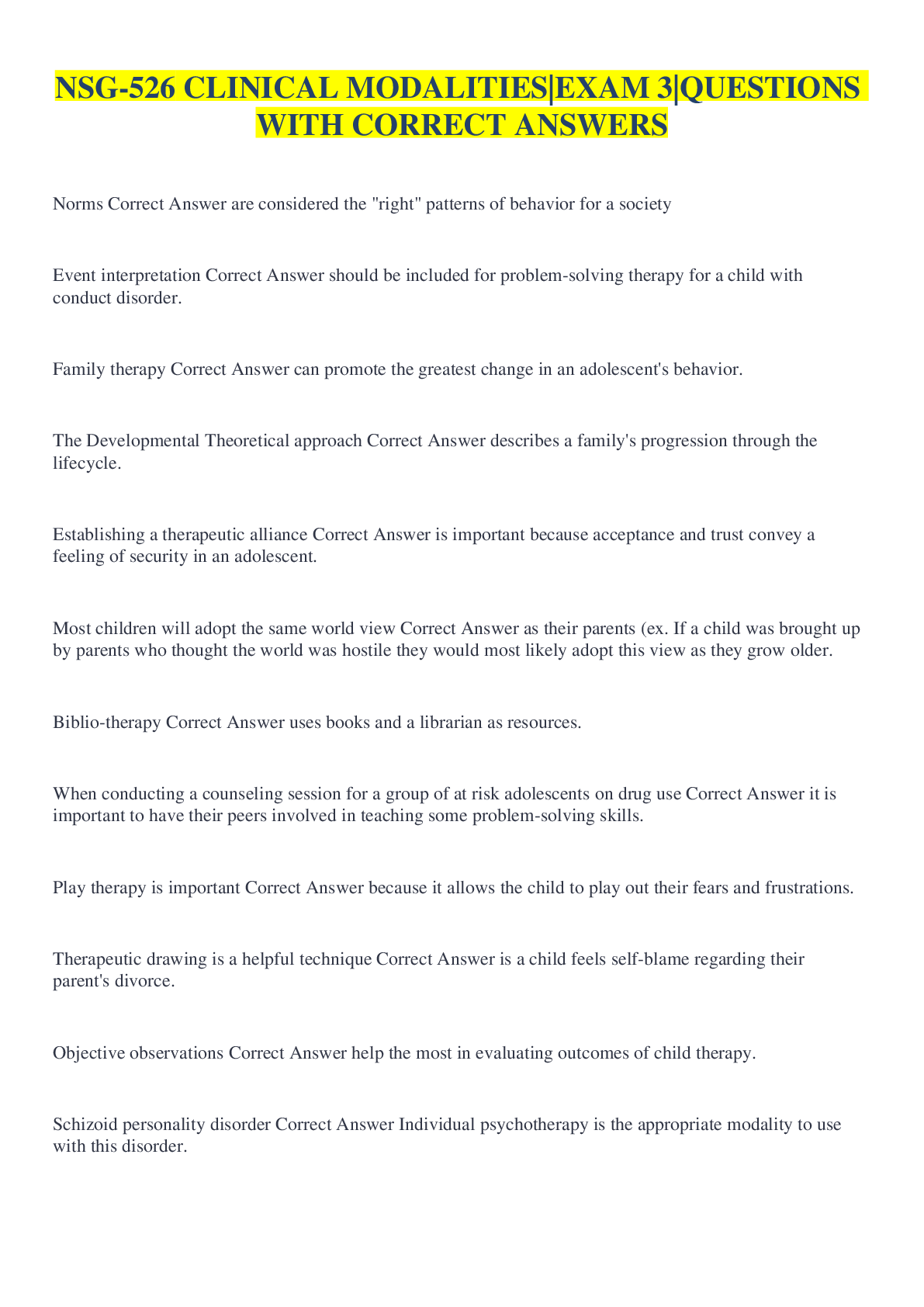
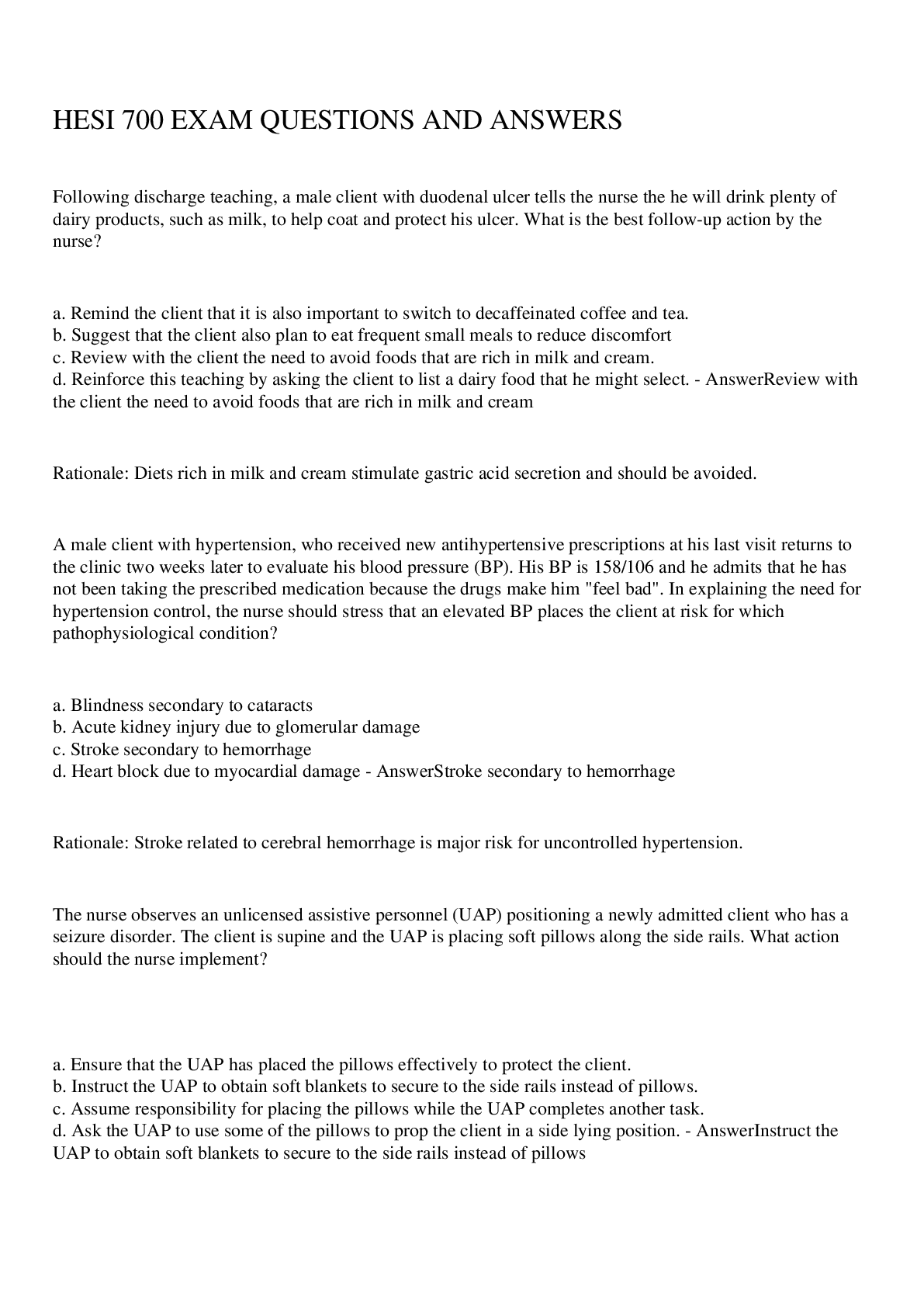
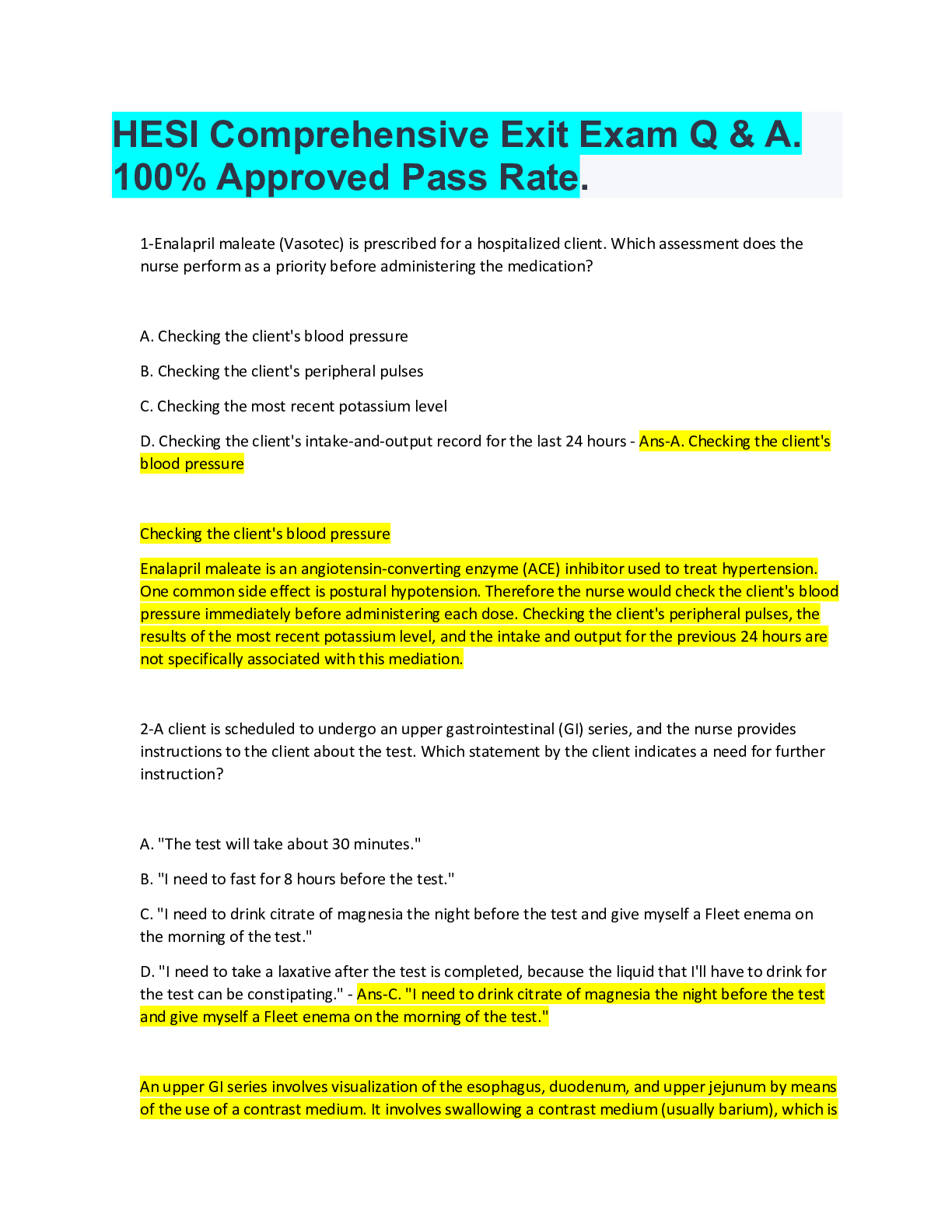
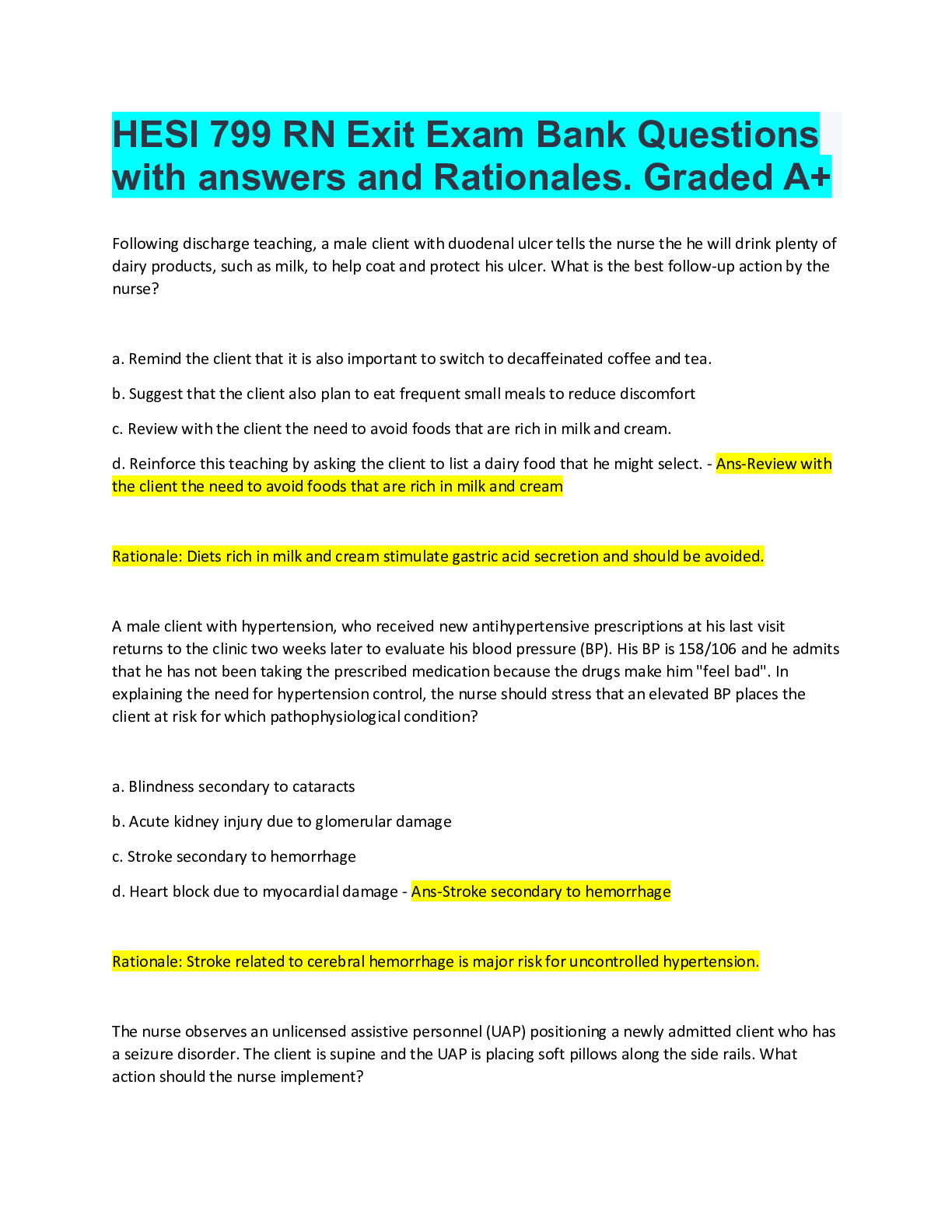

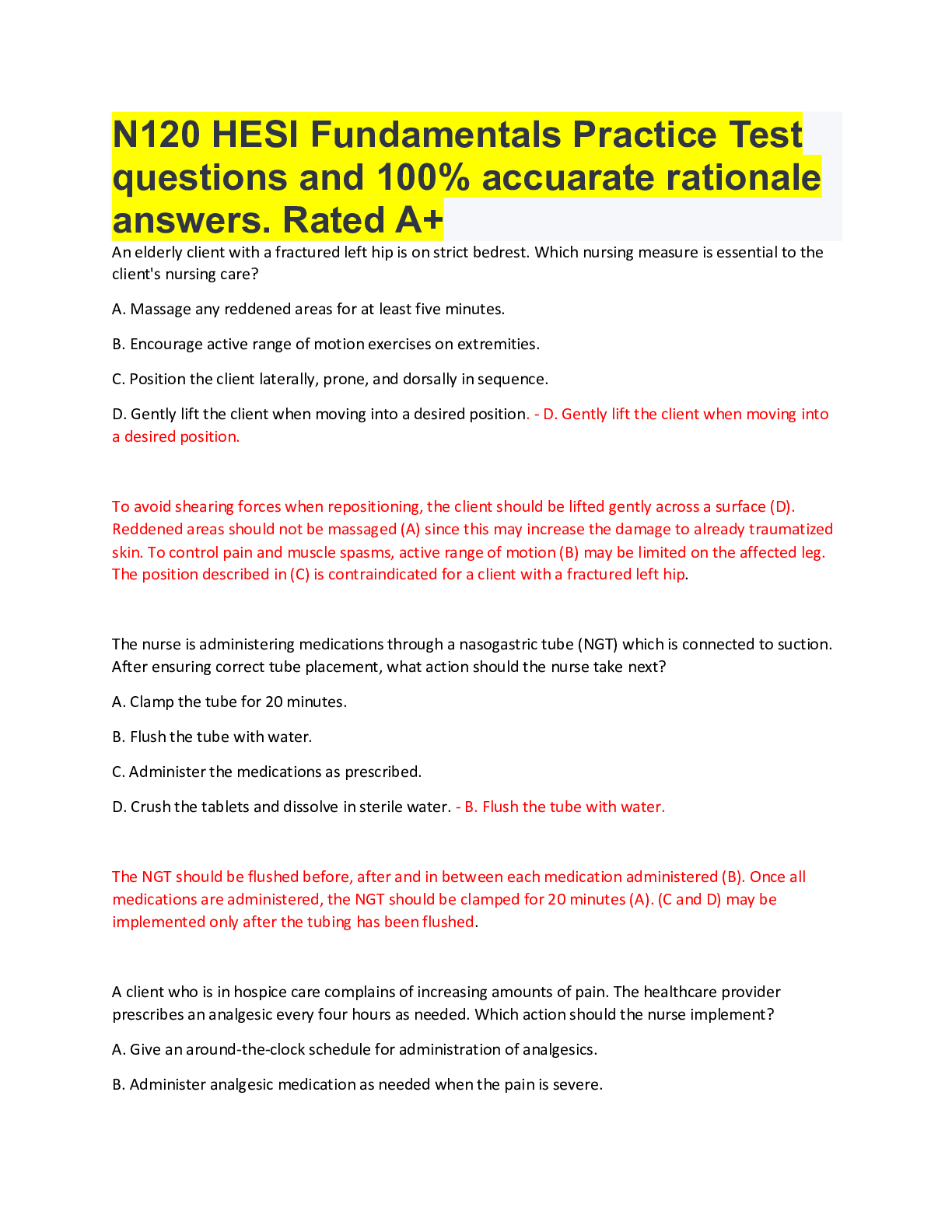

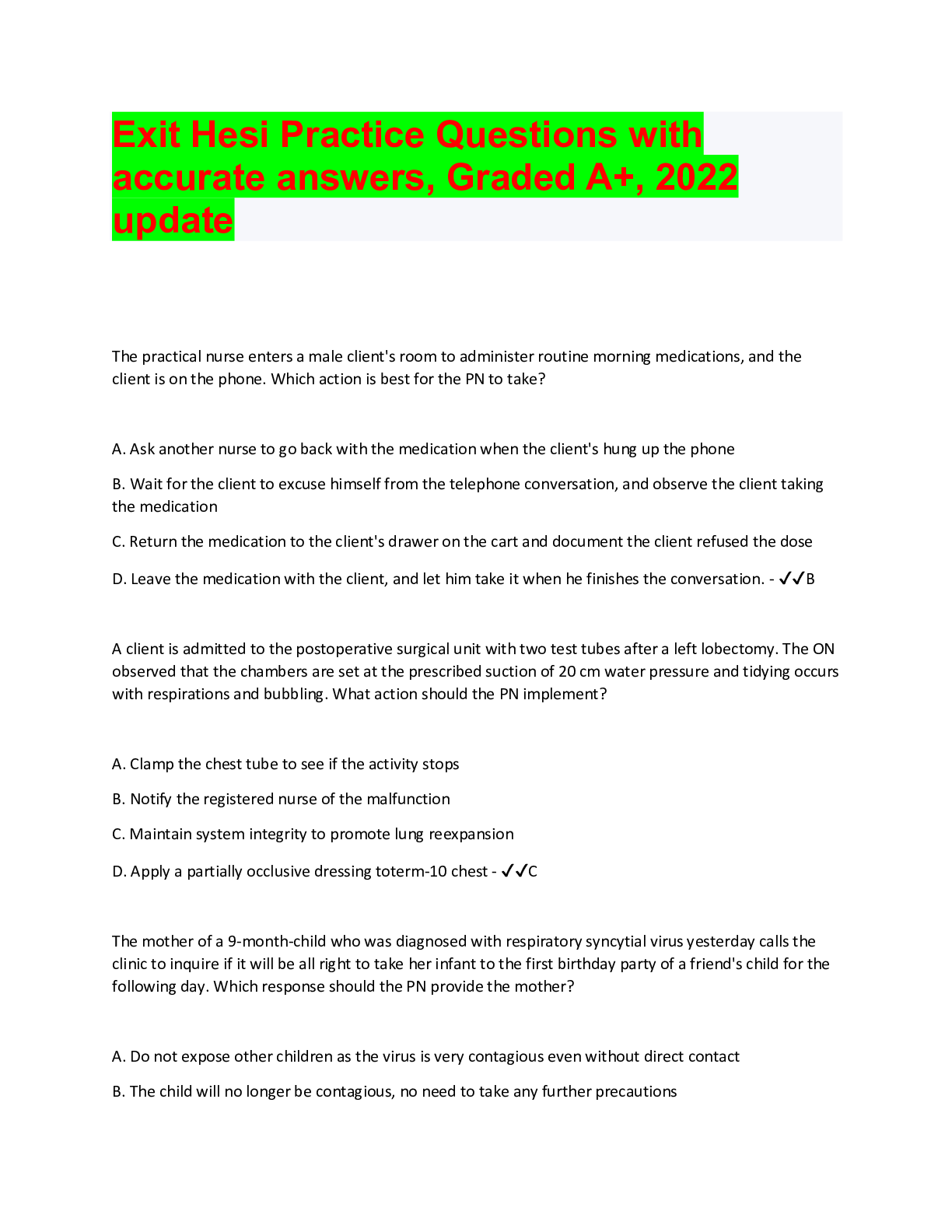
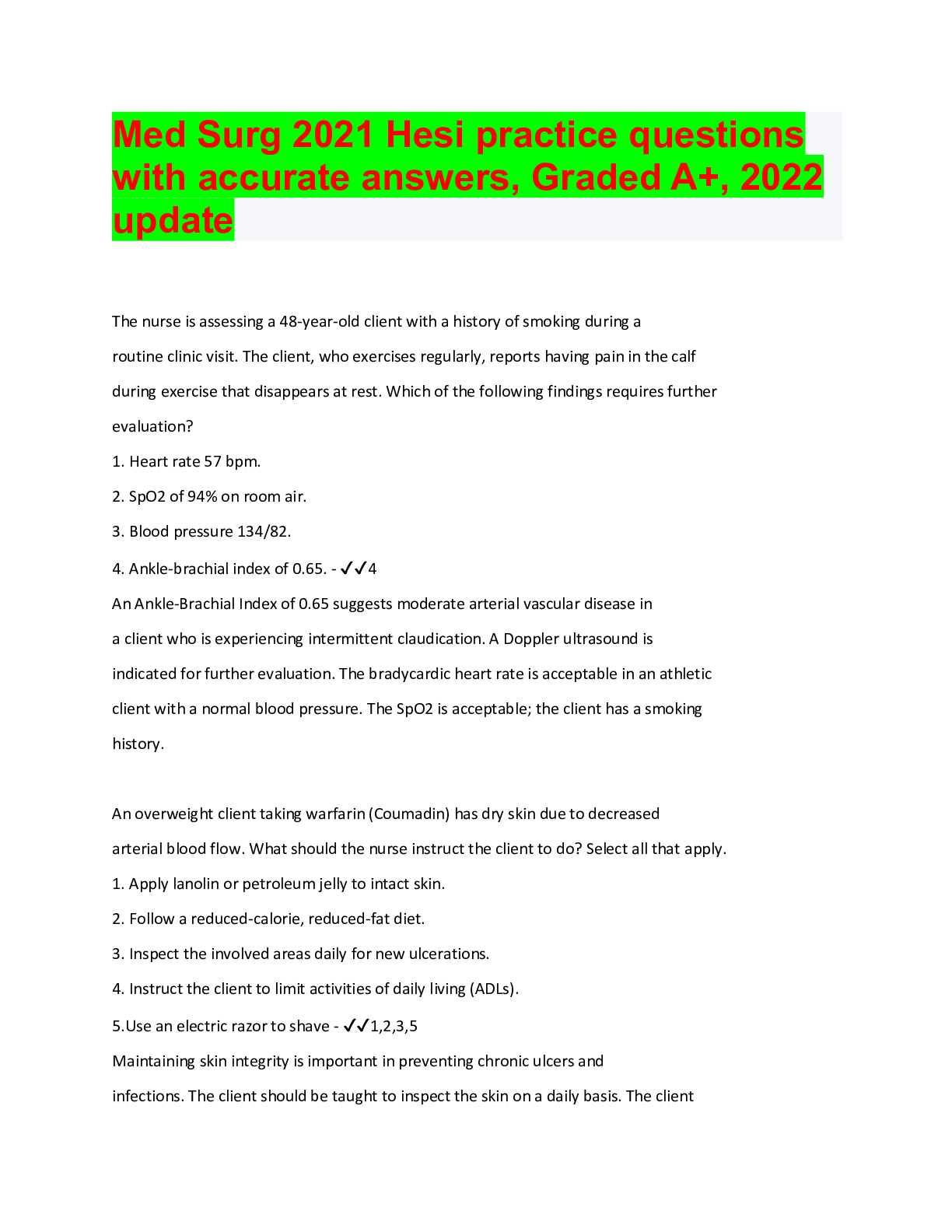

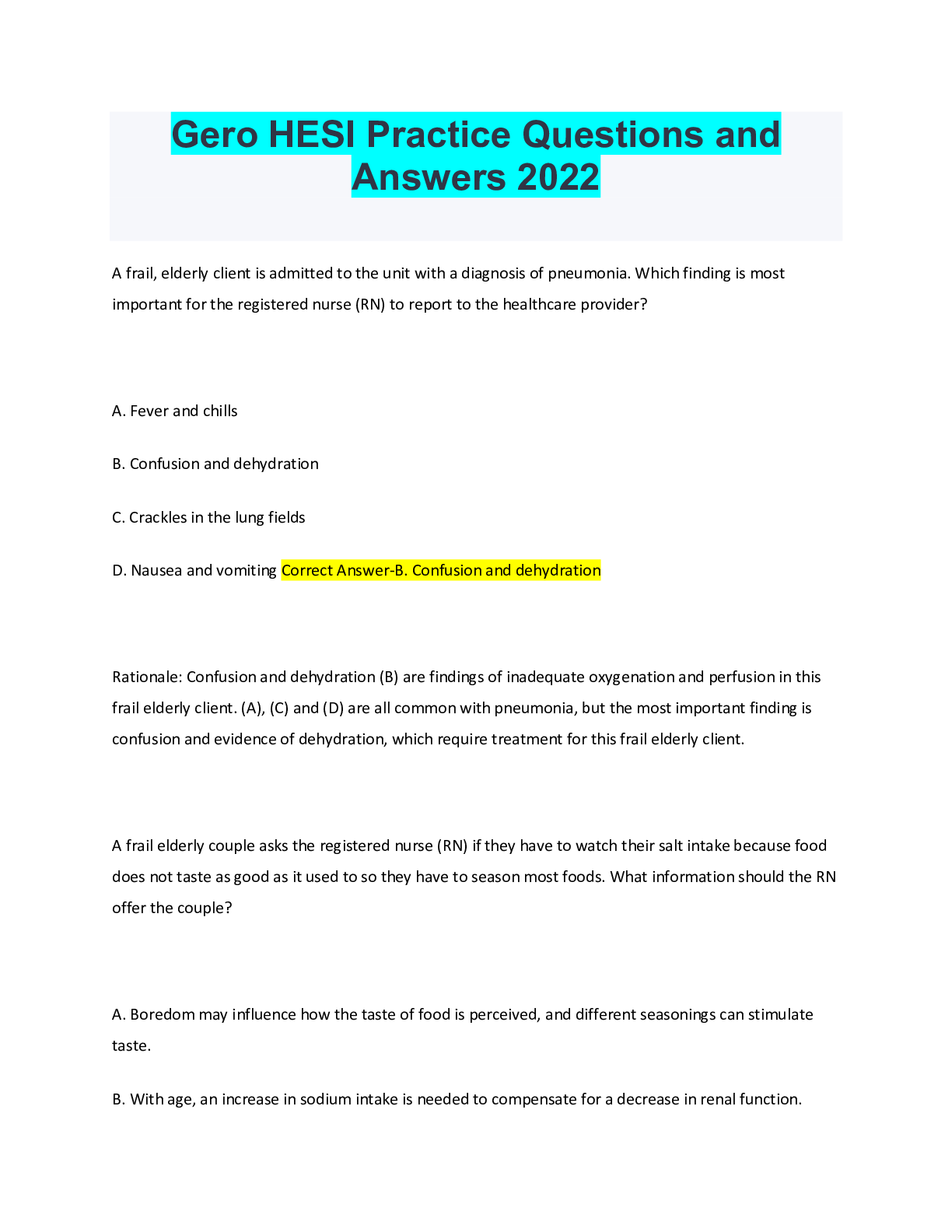
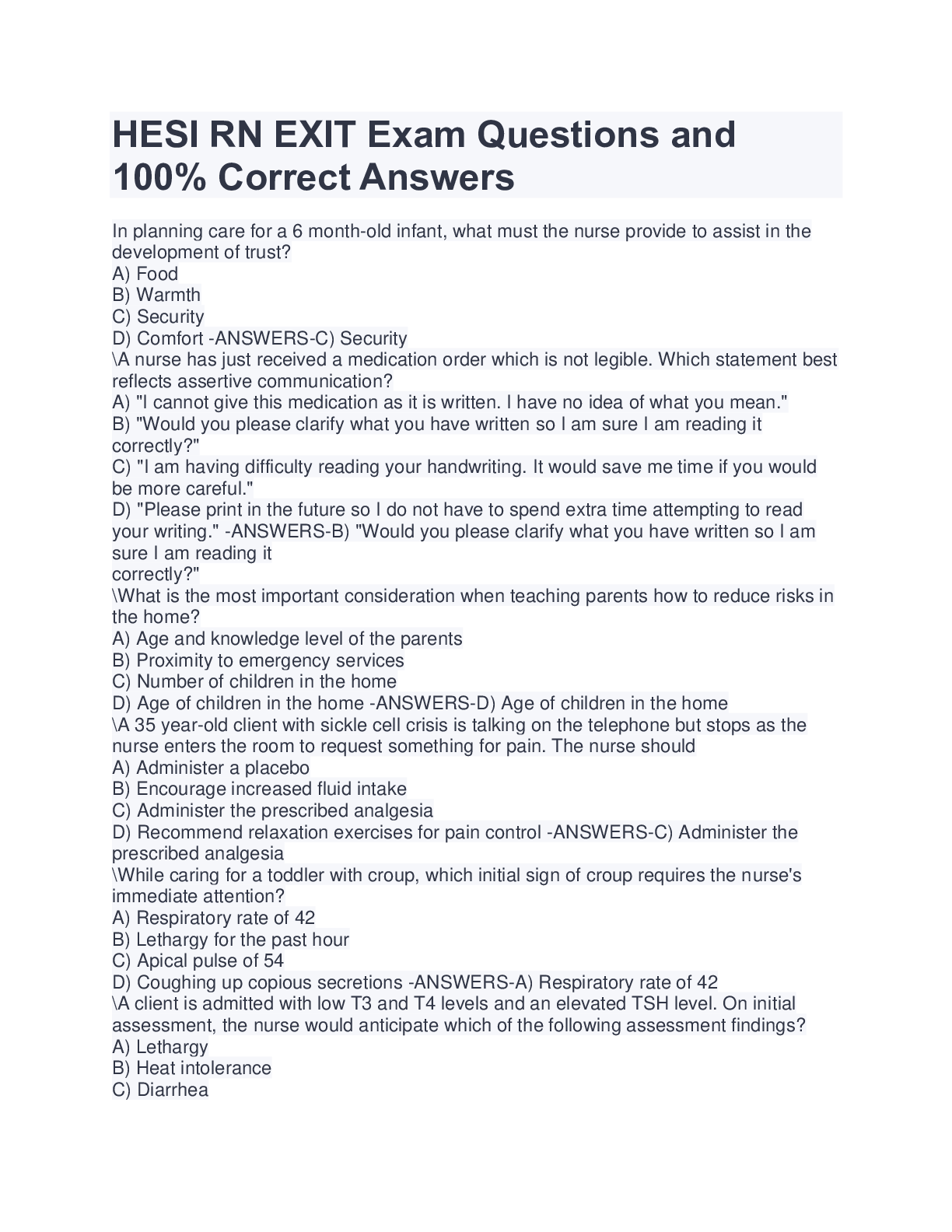
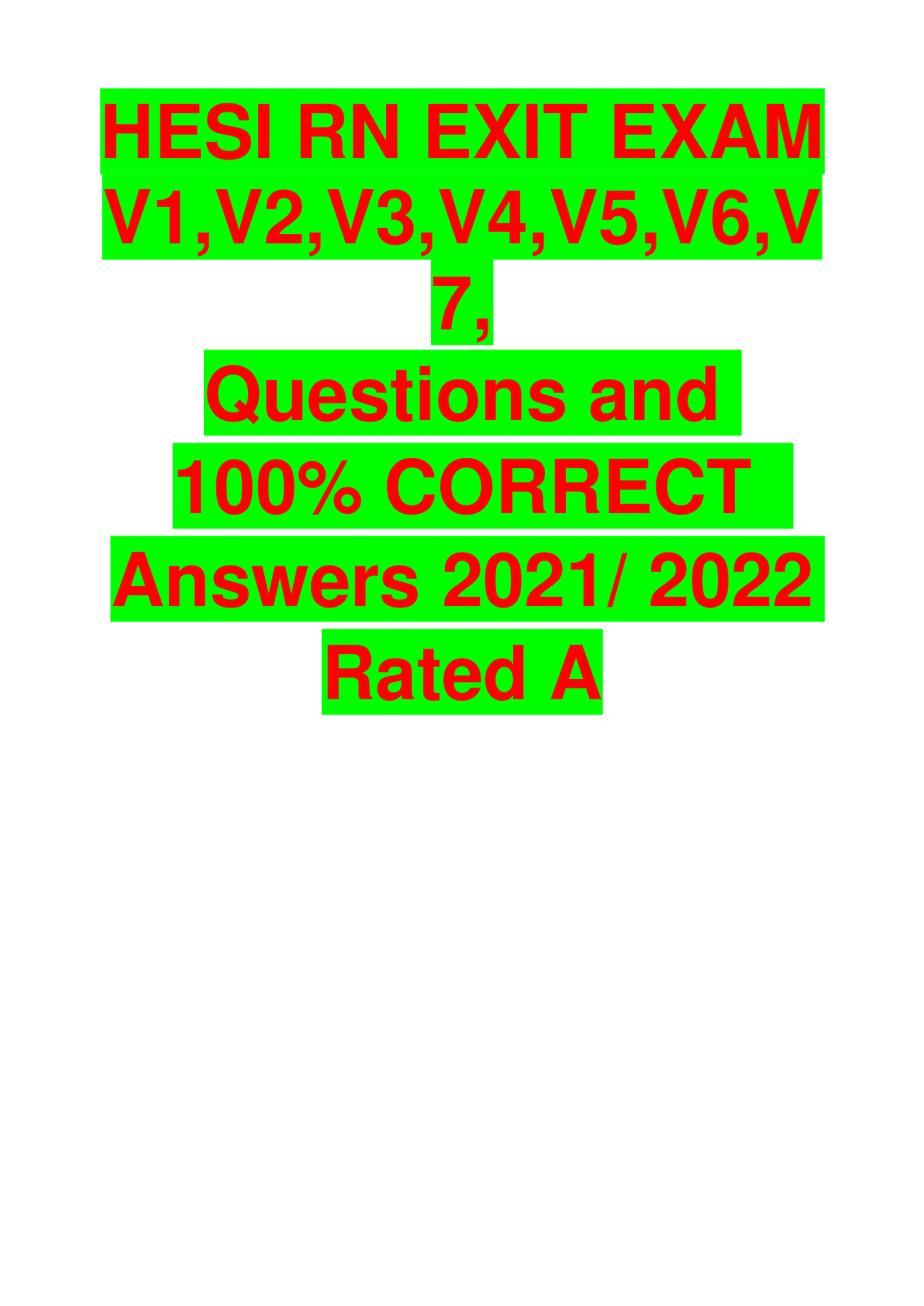
.png)
.png)
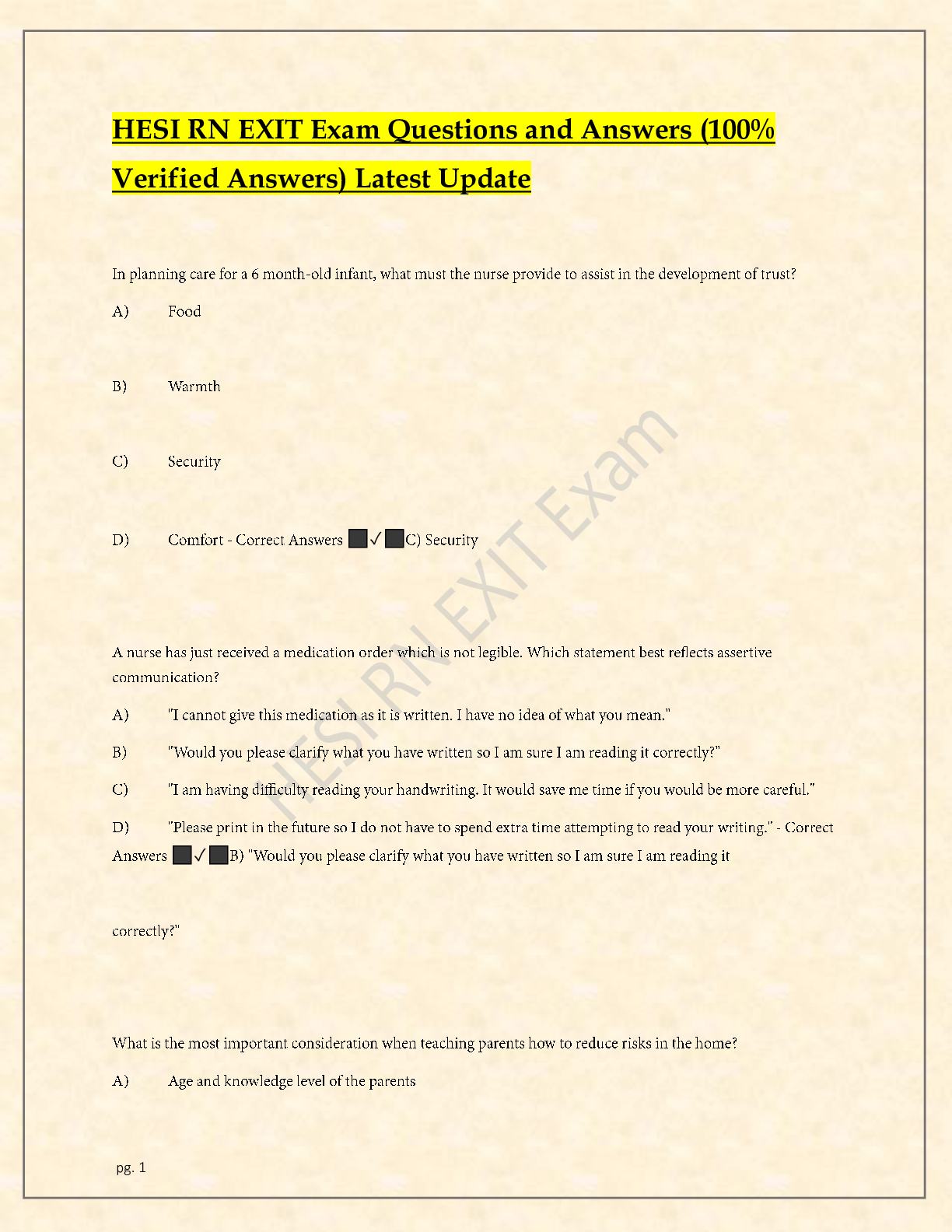
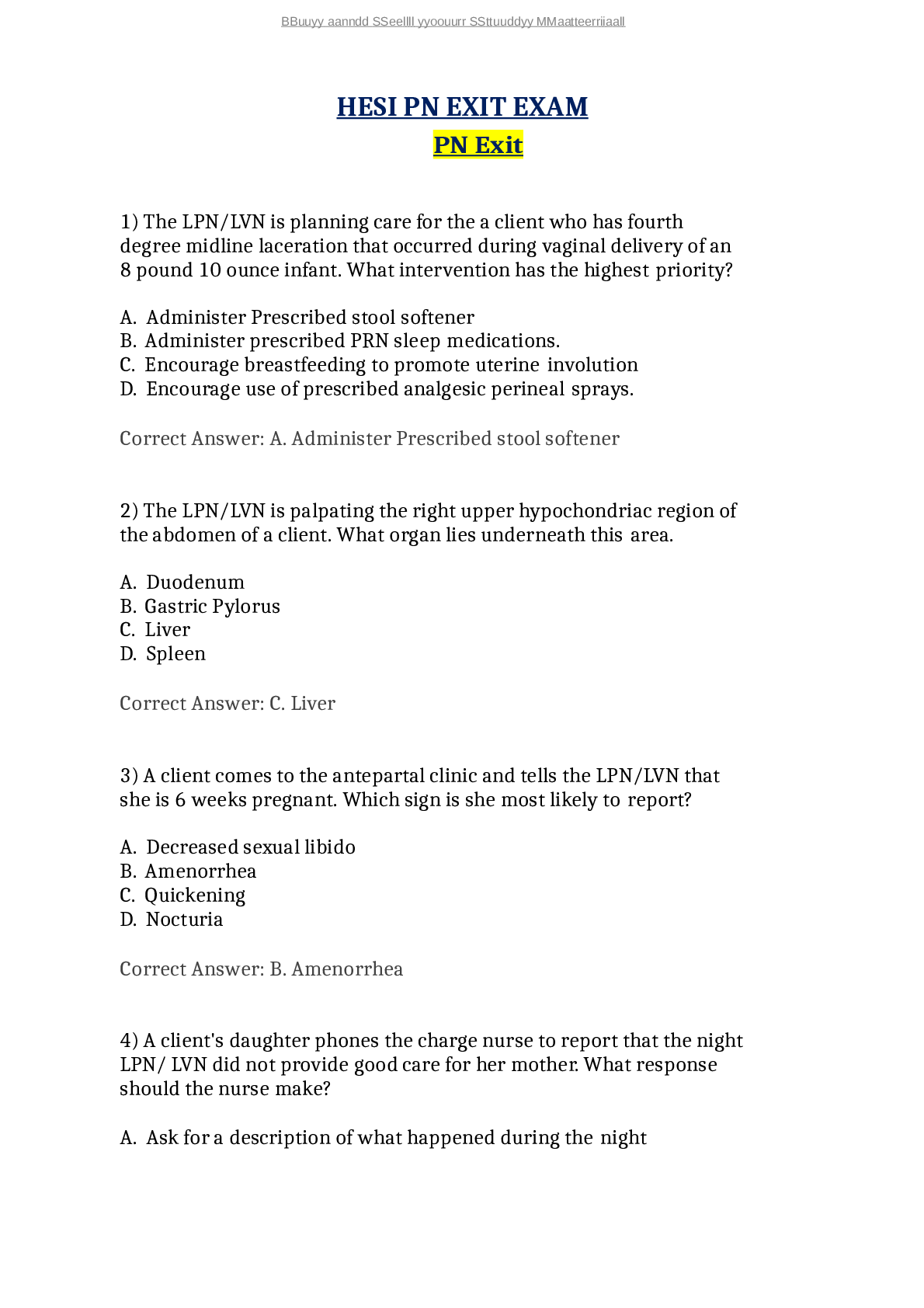
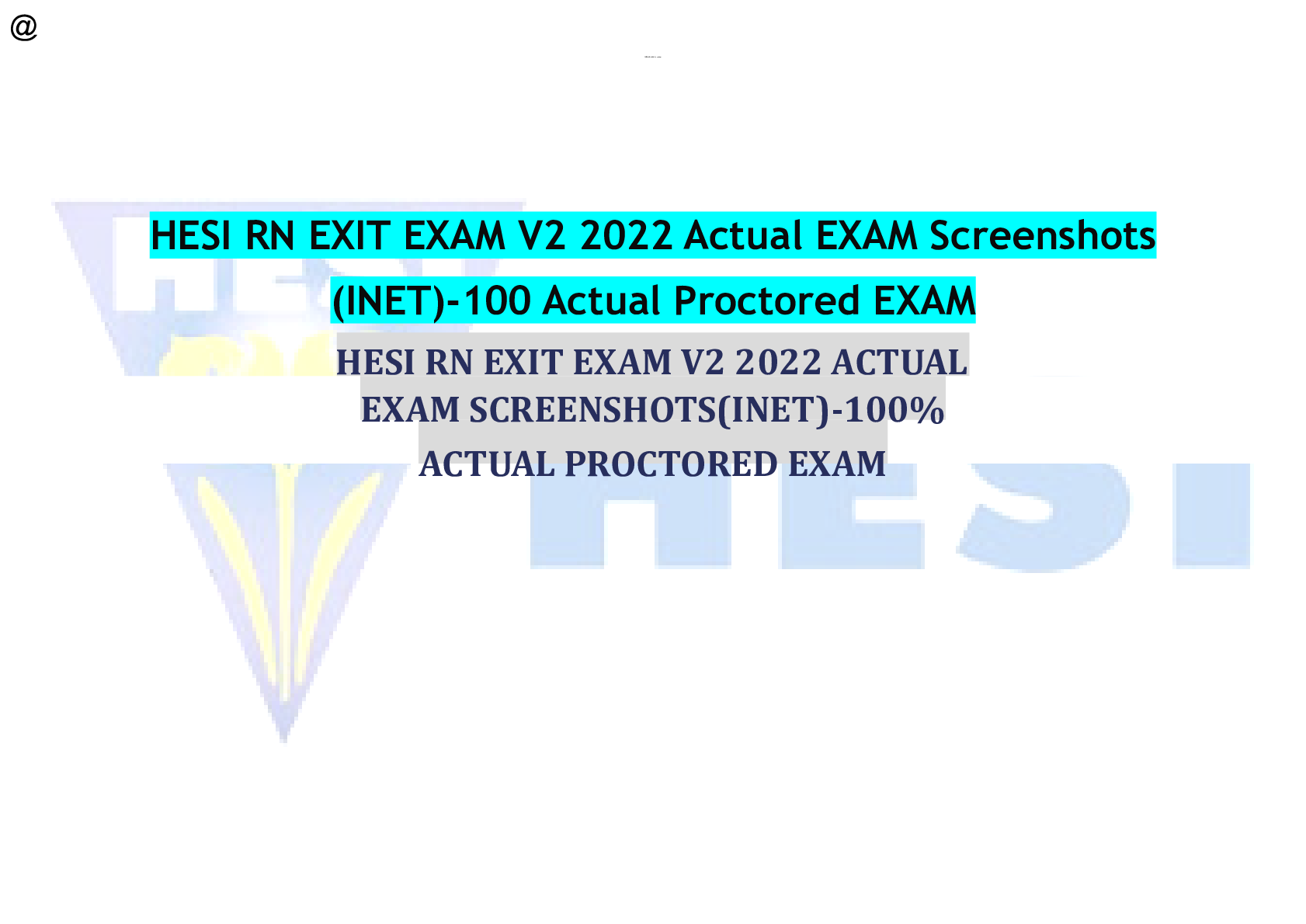
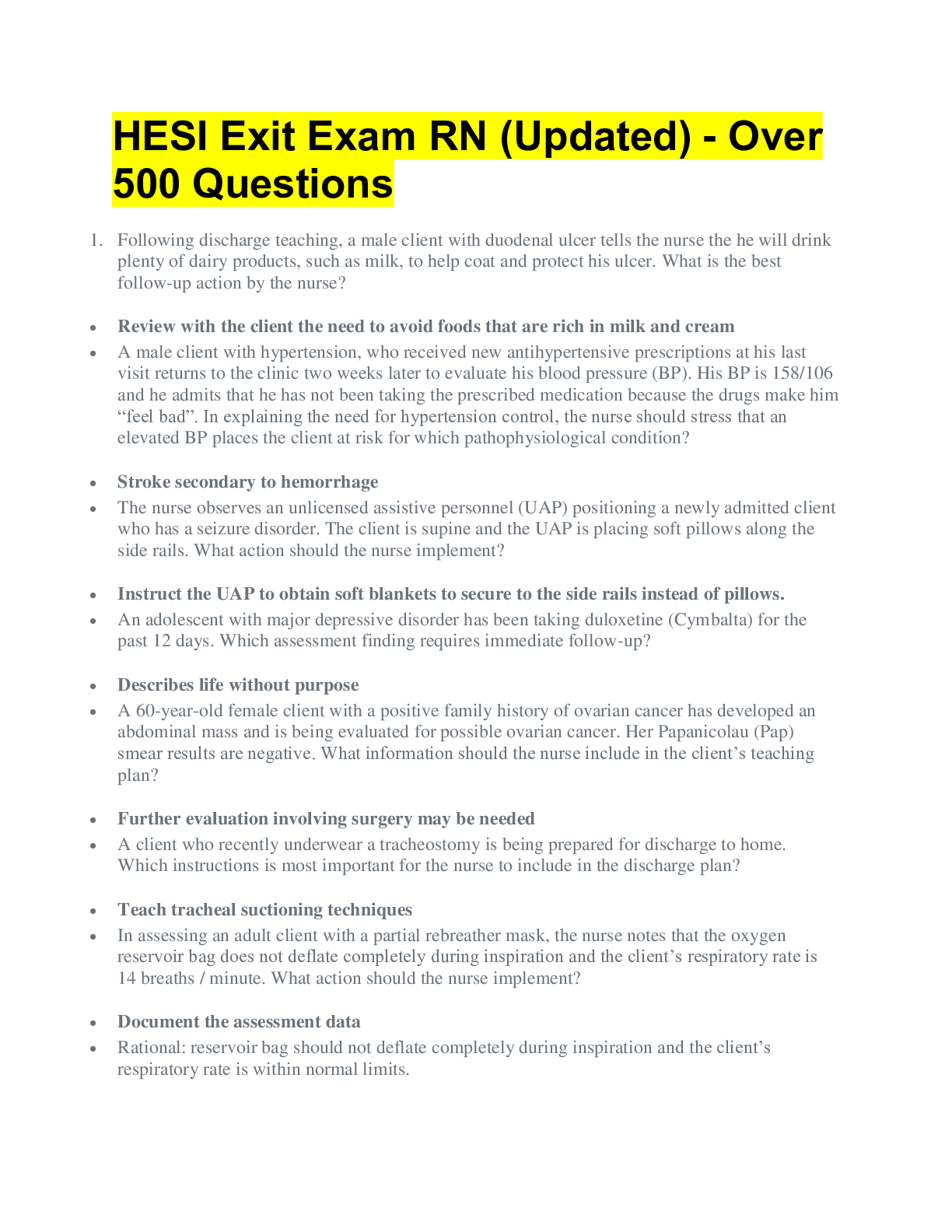
 (1).png)
